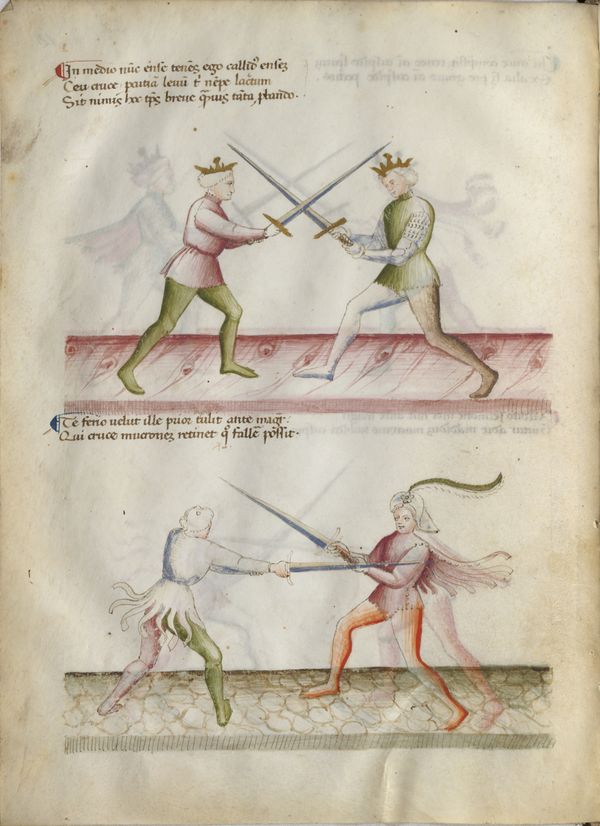|
|
You are not currently logged in. Are you accessing the unsecure (http) portal? Click here to switch to the secure portal. |
Difference between revisions of "User:Kendra Brown/Florius/English MS Latin 11269 14v"
Kendra Brown (talk | contribs) |
|||
| (14 intermediate revisions by 3 users not shown) | |||
| Line 8: | Line 8: | ||
|- | |- | ||
| | | | ||
| − | By crossing at mid-sword, I will strike your left arm;<br/>I will do this quickly because time is short. | + | By crossing at mid-sword, I will strike your left arm; <br/>I will do this quickly because time is short. |
| {{section|Page:Pisani-Dossi MS 19b.jpg|19b-c}} | | {{section|Page:Pisani-Dossi MS 19b.jpg|19b-c}} | ||
|- | |- | ||
| Line 19: | Line 19: | ||
</noinclude> | </noinclude> | ||
<poem> | <poem> | ||
| − | {{par|r}} I | + | ✅{{par|r}} I, the Clever One, currently holding the sword in the middle of the sword, |
| − | + | as in a cross; I will certainly hit your left shoulder | |
| − | + | This time might be exceedingly short: with this having been tested so much. | |
| − | {{par|b}} I strike a bargain with you just as that earlier master told before. | + | ✅{{par|b}} I strike a bargain with you<ref>This could also be translated as "I strike you"; however, the Italian has 'strike a bargain', which is also a translation of 'ferio te', and this is the only point where these two languages meet in this reading.</ref> just as that earlier master told before. |
| − | Whoever | + | Whoever restrains the tip with the cross can deceive with it.<ref>We are using the marginalia to influence our reading/interpretation of this couplet.</ref> |
</poem> | </poem> | ||
| + | <noinclude>{{reflist}} | ||
| + | [[File:MS Latin 11269 14v.jpg|600px]]</noinclude> | ||
Latest revision as of 19:31, 22 July 2025
Latin 14v
¶ In medio nunc ense tenens ego callidus ensem
Ceu cruce / percutiam laevum tibi nempe lacertum
Sit nimis hoc tempus breve quamvis tanta probando
¶ Te ferio velut ille prior tulit[1] ante magister.
Qui cruce mucronem retinet /[2] quo fallere possit.
Italian
|
By crossing at mid-sword, I will strike your left arm; |
[19b-c] Per incrosar a'meça spada el braço stancho te feriro |
|
From the Master who crosses at mid-sword, |
[19b-d] Per lo magistro che incrosa a'meça spada |
English 14v
✅¶ I, the Clever One, currently holding the sword in the middle of the sword,
as in a cross; I will certainly hit your left shoulder
This time might be exceedingly short: with this having been tested so much.
✅¶ I strike a bargain with you[3] just as that earlier master told before.
Whoever restrains the tip with the cross can deceive with it.[4]
- ↑ Added later: "dixit".
- ↑ Added later: "con? ut."
- ↑ This could also be translated as "I strike you"; however, the Italian has 'strike a bargain', which is also a translation of 'ferio te', and this is the only point where these two languages meet in this reading.
- ↑ We are using the marginalia to influence our reading/interpretation of this couplet.

